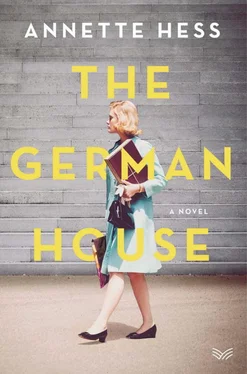Annette Hess
THE GERMAN HOUSE
THERE HAD BEEN ANOTHER fire last night. She smelled it the moment she stepped out, without a coat, a thin layer of snow blanketing the quiet Sunday-morning street. It must have happened near her house this time. The sharp odor cut through the familiar smell of damp winter air: charred rubber, burned fabric, and melted metal, but also singed leather and hair; some mothers used lambskins to protect their newborns from the cold. It was not the first time Eva wondered who could do such a thing, who could sneak through backyards to break into apartment buildings and set fire to the strollers parked in the entryways. Must be a lunatic—or a bunch of hoodlums! many thought. Fortunately, none of the fires had spread to the building. No one had yet been hurt. Other than financially, of course. A new baby carriage cost 120 marks at Hertie’s. No small peanuts for young families.
“Young families” echoed in Eva’s mind. She paced nervously up and down the sidewalk. It was freezing out. Although Eva wore no more than her new, light blue silk dress, she wasn’t cold—she was sweating with excitement. She was waiting for none other than, as her sister teased, the “apple of her eye,” her future husband, who would meet her family for the first time today, the third Sunday of Advent. He had been invited to the midday meal. Eva checked her watch. Three minutes past one. Jürgen was late.
The occasional car crawled by. It was snowdusting. Eva’s father had coined the term to describe this weather phenomenon: tiny ice flakes came sailing down from the clouds, as if someone up there were shaving an enormous block of ice. Someone who made all the decisions. Eva gazed up at the gray skies over whitish roofs. She discovered then that she was being watched: standing at the second-story window—above the sign that read “German House,” above the letters “ou”—was a beige figure looking down at her. Her mother. She appeared unmoved, but Eva had the feeling she was taking her leave. Eva quickly turned her back on her. She swallowed. That was all she needed right now. To start crying.
The door to the restaurant opened and her father came out, heavy and dependable in his white chef’s coat. He ignored Eva and opened the display case to the right of the door, to place a supposedly new menu in it, although Eva knew there wouldn’t be a new one until Shrove Tuesday. Her father was actually very worried. He doted on her and now jealously awaited the unknown man making his way there. Eva heard him softly singing one of those folk songs he delighted in butchering, pretending everything was normal. Much to his own dismay, Ludwig Bruhns was utterly unmusical: “While a-clownin’ at the gate, a little song comes to meeeee. Under the linden treeeeee.”
A younger woman with teased, light blond hair appeared next to Eva’s mother at the window. She overeagerly waved at Eva, but even at this distance, Eva could tell she was depressed. But Eva did not blame herself. She had waited long enough for her big sister to marry. Then Annegret turned twenty-eight—her waistline expanding with every passing year—and following a secret discussion with her parents, Eva decided to break with convention. Before it was too late. She was practically on the verge of becoming an old maid herself. She hadn’t had many admirers. Her family couldn’t understand it. Eva had such a healthy, feminine presence, with her full lips, slender nose, and long, naturally blond hair that she cut, styled, and sculpted into an artful updo by herself. Her eyes, though, often appeared troubled, as if she were anticipating some impending catastrophe. Eva suspected this frightened men away.
Five minutes past one. No Jürgen. Instead, the door to the left of the restaurant opened. Eva watched her little brother Stefan come out. He wasn’t wearing a coat, which prompted a concerned rapping on the window and gesticulation from their mother upstairs. Stefan obstinately trained his gaze ahead. After all, he had put on his orange pompom hat and matching mittens. He tugged a sled behind him. Purzel, the family’s black dachshund, scampered about his feet; he was a sneaky dog they couldn’t help but adore.
“Something stinks!” Stefan said.
Eva sighed. “You now, too! This family is a curse!”
Stefan began pulling the sled back and forth through the light snow on the sidewalk. Purzel sniffed at a streetlight, circled excitedly, then pooped in the snow. The pile steamed. The sled runners scraped across the asphalt, joined by the rasp of a snow shovel, as their father got to work before the entrance. Eva caught the way he clutched his back and screwed up his eyes. Her father was in pain—something he would never admit. One morning in October, after his back had been “smarting like hell,” as he put it, for some time, her father was unable to get out of bed. Eva called an ambulance, and the hospital X-rayed him and discovered a herniated disc. They’d operated, and the doctor advised him to close the restaurant. Ludwig Bruhns explained that he had a family to feed. And what about his measly pension? They urged him to hire a cook and get out of the kitchen. But Ludwig refused to allow a stranger to enter his realm. The solution had been to stop offering lunch, so since that fall, they’d opened only in the evening. Revenue had dropped by nearly half since then, but Ludwig’s back was feeling better. Still, Eva knew that her father’s greatest wish was to start serving lunch again that spring. Ludwig Bruhns loved his job, loved it when his guests gathered in good company, when they enjoyed the food and went home smiling, satisfied, and tipsy. “I serve up full bellies and happy hearts,” he liked to say. And Eva’s mother would tease back, “He who can, does. He who cannot, serves.”
Eva was feeling a bit chilled now. She crossed her arms and shivered. She hoped fervently that Jürgen would treat her parents with respect. There had been a few times she’d witnessed an unpleasant, condescending attitude toward waiters or shop girls.
“Police!” Stefan bellowed. A black-and-white vehicle with a siren on its roof was approaching. Two men in dark blue uniforms sat inside. Stefan froze in awe. The officers were surely headed for the burned stroller, Eva thought, to collect evidence and question the building’s residents whether they’d noticed anything suspicious the night before. The car glided by almost soundlessly. The policemen gave first Ludwig, then Eva a nod. People knew each other in this neighborhood. The car turned onto König Strasse. Sure enough, the fire must have been in the housing estate. That new pink apartment building. Lots of families live there. Young families .
Twelve minutes past one. He’s not coming. He reconsidered. He’ll call tomorrow and tell me we aren’t a good match. The disparity in our families’ social standing, darling Eva, is just too great for us to bridge . Pow!!! Stefan had thrown a snowball at her. He hit her square in the chest, and the icy snow slid down into her dress. Eva grabbed Stefan by the sweater and yanked him toward her. “Are you crazy?! This is a brand-new dress!” Stefan bared his teeth, his guilty face. Eva would’ve scolded him further, but at that moment Jürgen’s yellow car appeared at the end of the street. Her heart leapt like a spooked calf. Eva cursed her nerves, which she’d even seen a doctor about. Breathe deeply . It was something she failed to do now, because as Jürgen’s car drew near, Eva was struck by the realization that nothing would ever convince her parents of Jurgen’s ability to make her happy. Not even his money. Eva could make out Jürgen’s face behind the windshield. He looked tired. And serious. He didn’t even glance at her. For one horrifying moment, Eva thought he might step on the gas and drive off. But then the car slowed. Stefan burst out, “Gee, he’s got black hair! Like a Gypsy!”
Читать дальше
Конец ознакомительного отрывка
Купить книгу













